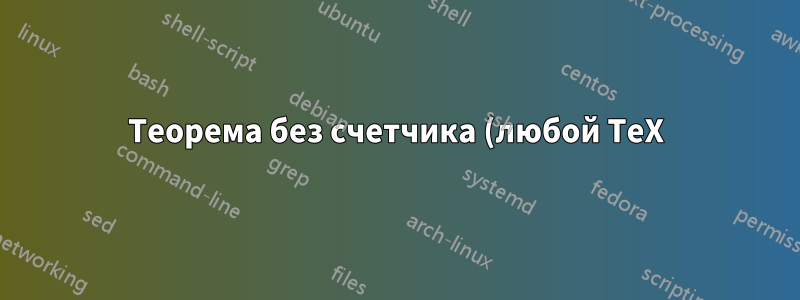.png)
Я часто использую теоремы в LaTeX и определил различные их виды. Иногда, однако, лучше не определять конкретную теорему, которая в противном случае была бы раз в долгое время используемой, как, например, «Основная теорема алгебры» или «Теорема о волосатом шаре» и т. д. PDF-файл, который я нашел в Интернете, предлагает следующий код:
\makeatletter
\newtheorem{@thmattr}[thm]{\theorem@attr}
\newenvironment{thmattr}[1]
{\def\theorem@attr{#1}\begin{@thmattr}}
{\end{@thmattr}}
\makeatother
Единственная проблема в том, что помимо необходимости определения счетчика thm(которое легко решить, удалив [thm]), это дает таким теоремам счетчик. Так что я получаю "Основную теорему алгебры 1", что не имеет смысла, поскольку существует только одна теорема с таким названием. Так что вопрос в следующем: как мне создать теорему без счетчика?
решение1
Если у вас есть одна именованная теорема, самый простой способ —
\usepackage{amsthm}
\newtheorem*{HBT}{Hairy Ball Theorem}
так что
\begin{HBT}
There is no nonvanishing continuous tangent vector field on
even dimensional $n$-spheres.
\end{HBT}
произведет то, что вы хотите.
Если у вас есть несколько именованных теорем, то подойдет стратегия, похожая на ту, что вы нашли:
\newtheorem*{namedthm*}{\thistheoremname}
\newcommand{\thistheoremname}{} % initialization
\newenvironment{namedthm}[1]
{\renewcommand{\thistheoremname}{#1}\begin{namedthm*}}
{\end{namedthm*}}
и вход будет
\begin{namedthm}{Hairy Ball Theorem}
There is no nonvanishing continuous tangent vector field on
even dimensional $n$-spheres.
\end{namedthm}
Вы также можете указать авторство обычным способом:
\begin{namedthm}{Hairy Ball Theorem}[Brouwer]
There is no nonvanishing continuous tangent vector field on
even dimensional $n$-spheres.
\end{namedthm}
Полный пример; выберите предпочтительную стратегию.
\documentclass{article}
\usepackage{amsthm}
\newtheorem*{HBT}{Hairy Ball Theorem}
\newtheorem*{namedthm*}{\thistheoremname}
\newcommand{\thistheoremname}{} % initialization
\newenvironment{namedthm}[1]
{\renewcommand{\thistheoremname}{#1}\begin{namedthm*}}
{\end{namedthm*}}
\begin{document}
\begin{HBT}
There is no nonvanishing continuous tangent vector field on
even dimensional $n$-spheres.
\end{HBT}
\begin{namedthm}{Hairy Ball Theorem}
There is no nonvanishing continuous tangent vector field on
even dimensional $n$-spheres.
\end{namedthm}
\begin{namedthm}{Hairy Ball Theorem}[Brouwer]
There is no nonvanishing continuous tangent vector field on
even dimensional $n$-spheres.
\end{namedthm}
\end{document}

решение2
Используя ntheorem, вы получаете стили emptyи emptybreakтеоремы. Имя — необязательный аргумент. Вот 4 возможности (мне пришлось исправить пустой стиль, потому что он не принимал label separator):
\documentclass[12pt,a4paper]{article}
\usepackage[utf8]{inputenc}
\usepackage[T1]{fontenc}
\usepackage{MinionPro}
\usepackage{amsmath}
\usepackage[svgnames, x11names]{xcolor}
\usepackage{framed}
\usepackage[framed, amsmath, thmmarks]{ntheorem}%
\newcommand*\C{\mathbf C}
\makeatletter
\renewtheoremstyle{empty}%
{\item[]}%
{\item[\theorem@headerfont \hskip\labelsep\relax ##3\theorem@separator]}
\makeatother
\theoremheaderfont{\upshape\scshape}
\theorembodyfont{\itshape}
\theoremstyle{empty}
\theoremseparator{.\,—}
\newtheorem{namedthm}{}
\newframedtheorem{namedfrthm}{}
\theoremstyle{emptybreak}
\theoremheaderfont{\bfseries\scshape}
\theorembodyfont{\upshape\color{DarkSeaGreen4}}
\theoremseparator{\smallskip}
\newtheorem{NamedThm}{}
\newframedtheorem{NamedfrThm}{}
%\newframedtheorem{namedfrthm}}
\begin{document}
\begin{namedthm}[Fundamental Theorem of Algebra]
Every polynomial with coefficients in $ \C $ has a root in $ \C $. In other words, the field of complex numbers is algebraically closed.
\end{namedthm}
\begin{namedfrthm}[Fundamental Theorem of Algebra]
Every polynomial with coefficients in $ \C $ has a root in $ \C $. In other words, the field of complex numbers is algebraically closed.
\end{namedfrthm}
\begin{NamedThm}[Fundamental Theorem of Algebra]
Every polynomial with coefficients in $ \C $ has a root in $ \C $. In other words, the field of complex numbers is algebraically closed.
\end{NamedThm}
\begin{NamedfrThm}[Fundamental Theorem of Algebra]
Every polynomial with coefficients in $ \C $ has a root in $ \C $. In other words, the field of complex numbers is algebraically closed.
\end{NamedfrThm}
\end{document}



